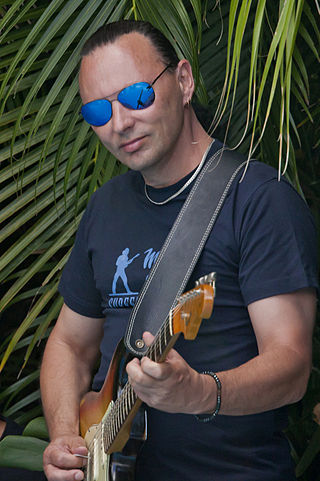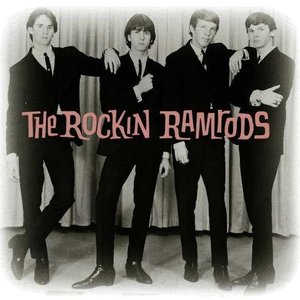Instrumental rock is rock music that emphasizes instrumental performance and features very little or no singing. Examples of instrumental music in rock can be found in practically every subgenre of the style. Instrumental rock was most popular from the mid-1950s to mid-1960s, with artists such as Bill Doggett Combo, The Fireballs, The Shadows, The Ventures, Johnny and the Hurricanes and The Spotnicks. Surf music had many instrumental songs. Many instrumental hits had roots from the R&B genre. The Allman Brothers Band feature several instrumentals. Jeff Beck also recorded two instrumental albums in the 1970s. Progressive rock and art rock performers of the late 1960s and early 1970s did many virtuosic instrumental performances.

Head Injuries is the second studio album by Australian rock band Midnight Oil, released in October 1979 on their own Powderworks label and distributed by Columbia Records. The album was produced by Leszek J. Karski, recorded at 'Trafalgar Studios' in Sydney. It was the last Midnight Oil album to feature founding bass guitarist Andrew James, who quit the band due to illness. It peaked at No. 36 on the Australian Kent Music Report and by mid-1980 had achieved gold status in Australia.
Surf music is a genre of rock music associated with surf culture, particularly as found in Southern California. It was especially popular from 1958 to 1964 in two major forms. The first is instrumental surf, distinguished by reverb-heavy electric guitars played to evoke the sound of crashing waves, largely pioneered by Dick Dale and the Del-Tones. The second is vocal surf, which took elements of the original surf sound and added vocal harmonies, a movement led by the Beach Boys.

The Ventures are an American instrumental rock band formed in Tacoma, Washington, in 1958, by Don Wilson and Bob Bogle. The band, which was a quartet for most of its existence, helped to popularize the electric guitar across the world during the 1960s. While their popularity in the United States waned in the 1970s, the group remains especially revered in Japan, where they have toured regularly. The classic lineup of the band consisted of Wilson, Bogle, Nokie Edwards, and Mel Taylor (drums).
Billy Thorpe and the Aztecs were an Australian rock band formed in Sydney in 1963. They were active in two incarnations, the first as a beat band from 1963–1967, and as a hard rock band from 1968–1973. They emerged in 1964 with their cover of "Poison Ivy", which kept The Beatles from the top spot of the Sydney charts during the latter's Australian tour. They enjoyed further success through 1965 when the original members quit after a financial dispute.
The Bomboras are an American all-instrumental surf band from Los Angeles, California, United States. The band was formed in the summer of 1994, sharing a love of 1960s surf and garage music such as The Ventures, Booker T, and The Sonics.

William Richard Thorpe AM was an English-born Australian singer-songwriter, and record producer. As lead singer of his band Billy Thorpe & the Aztecs, he had success in the 1960s with "Blue Day", "Poison Ivy", "Over the Rainbow", "Sick and Tired", "Baby, Hold Me Close" and "Mashed Potato"; and in the 1970s with "Most People I Know Think That I'm Crazy". Featuring in concerts at Sunbury Pop Festivals and Myer Music Bowl in the early 1970s, the Aztecs also developed the pub rock scene and were one of the loudest groups in Australia.
The Sydney Symphony is internationally renowned and regularly performs in the Concert Hall of the Sydney Opera House under Chief Conductor Vladimir Ashkenazy. City Recital Hall is dedicated mainly to chamber music and chamber orchestra concerts, featuring many famous international artists as well as concert series by fine local groups such as the renowned Australian Chamber Orchestra and Sydney's foremost Baroque orchestra, the Australian Brandenburg Orchestra.
Barry John Stanton was an English-Australian rock and roll musician. He performed on pop music programs, Six O'Clock Rock, Bandstand, Johnny O'Keefe Show, Sing Sing Sing, Saturday Date, and Woody's Teen Time. He issued a compilation album, A Tribute to the King Rare Songs 1957-1965, in 1988.
Bombora is an indigenous Australian term for an area of large sea waves breaking over a shallow area such as a submerged rock shelf, reef, or sand bank that is located some distance from the shoreline and beach surf break. In slang, it is also called a bommie.
The Strangers were an Australian rock band formed in 1961 and existed until 1975. The band started out playing instrumental songs in a style similar to The Shadows, with influences from Cliff Richard. The original line-up was Laurie Arthur, Peter Robinson (bass), Graeme "Garth" Thompson (drums) and Fred Wieland. Robinson had previously played with a local band The Thunderbirds and went on to replace Athol Guy in the Seekers in the late 1970s.

Martin Cilia is an Australian musician. Cilia is best known for his songwriting skills, and his membership in The Atlantics, where he performs on the guitar. Cilia played his first gig in a school hall in Morley High in 1972 with fellow students. He remembered playing songs by The Shadows, The Monkees, The Beatles, and Cat Stevens.
Sven Erik Libaek is a Norwegian-Australian composer, record producer and musician. He composes film and TV soundtrack music and, as the staff producer for the Australian division of CBS Records, influenced the Australian popular music scene in the mid-1960s. In 1982, an album titled Endless Love peaked at number 71 in Australia; his only top 100 charting release.

The Delltones were an Australian rock 'n' roll band, which formed in 1958. They started as a doo-wop, harmony quartet with Warren Lucas, Brian Perkins, Noel Widerberg and Ian "Peewee" Wilson. In July 1962 Noel Widerberg died in a car accident in Brighton-le-Sands in Sydney, and three weeks later the group's single, "Get a Little Dirt on Your Hands", reached the top five on the local charts. Widerberg's position was filled by Col Loughnan. The group disbanded in 1973.
Johnny Rebb, born Donald James Delbridge, was an Australian singer.
Jerald Edward Kolbrak, known professionally as Jerry Cole, was an American guitarist who recorded under his own name, under various budget album pseudonyms and as an uncredited session musician.

The (Original) Surfaris were a surf music band from California. They were active from the early to mid 1960s and had singles released on various labels which included Del-Fi, Northridge, and Reprise.

The Rockin’ Ramrods were an American garage rock band from Boston, Massachusetts, who were active in the 1960s and early 1970s. Along with the Barbarians, the Remains and the Lost, they were one of the most popular acts in the Boston area. While they did not achieve national success, their work is today well-regarded by garage rock collectors and enthusiasts. They are perhaps best remembered for the 1964 protopunk anthem "She Lied." Though best known as the Rockin’ Ramrods, they recorded under other names. They recorded one single as the GTO's.
The Black Diamonds were an Australian garage rock band from Lithgow, New South Wales, which were active under different names from 1959 to 1971. By 1965 the line-up consisted of Glenn Bland on vocals and harmonica, Allen Keogh on bass guitar, Colin McAuley on drums, Alan "Olly" Oloman on lead guitar and vocals, and his younger brother Neil Oloman on rhythm guitar. They signed with Festival Records, where they released two singles. The better-known B-side track, "I Want, Need, Love You", appeared on their first single in 1966 and became a regional hit. It features an pleading vocal over a driving rhythm section and fast guitar breaks. The band toured in support of the Easybeats. In 1967 their second single, "Outside Looking In", was a hit in the Sydney area. In 1968 the group changed their name to Tymepiece and evolved into a more eclectic and progressive style. Briefly changing their name to Love Machine they released a cover version of the Tokens' single, "Lion Sleeps Tonight" (1968). They reverted to Tymepiece and issued an album, Sweet Release, in February 1971 but broke up soon after. According to Australian musicologist, Ian McFarlane, "[they] will be remembered as one of the most ferocious garage/punk outfits Australia ever produced in the 1960s."
The Gamblers were an American surf rock band formed in Los Angeles, California, in 1959. Distinguished by their vocal harmonies and early instrumental surf songs, the Gamblers are one of the first influential musical acts that recorded surf music, a genre popularized initially in Southern California. The group, led by primary songwriter Derry Weaver, recorded the "Moon Dawg!" single in late 1959, acknowledged as one of the earliest known surf records, and covered by West Coast groups such as the Beach Boys. In 1961, the group disbanded but its members, including Elliot Ingber, Larry Taylor, Bruce Johnston, and Sandy Nelson, went on to have successful music careers of their own.







